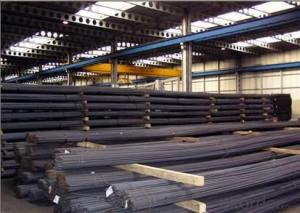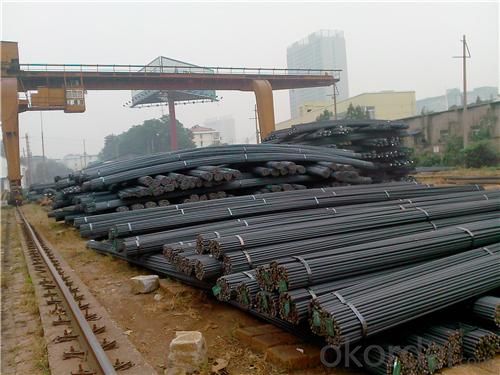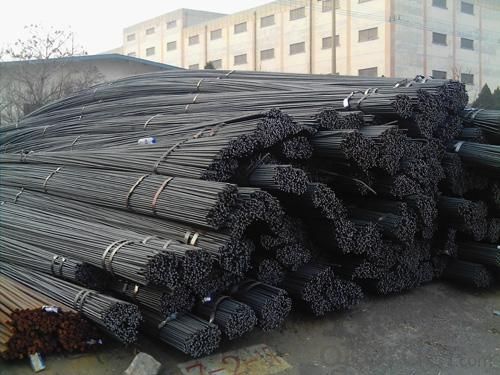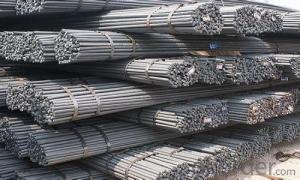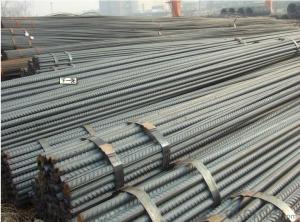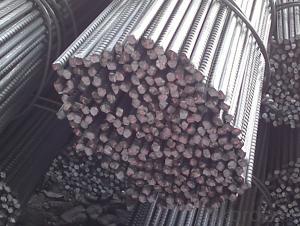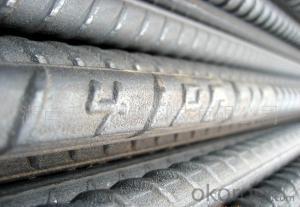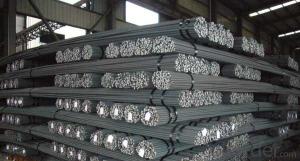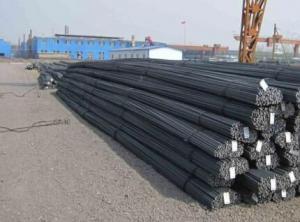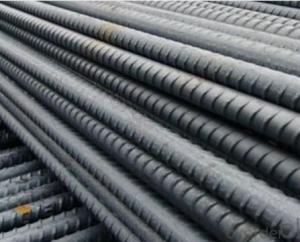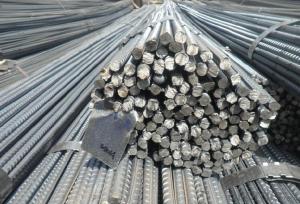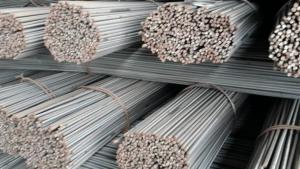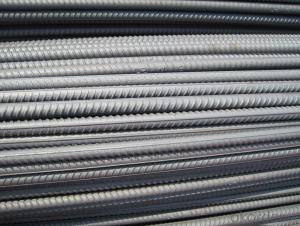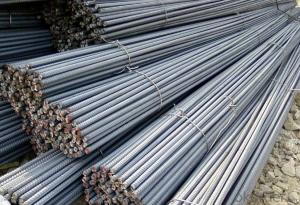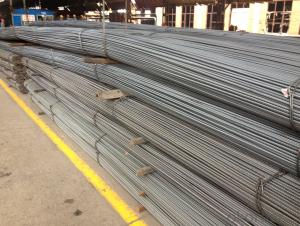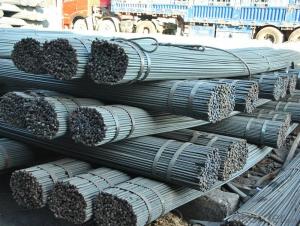ASTM A615 deformed steel bar for construction
- Loading Port:
- Tianjin
- Payment Terms:
- TT OR LC
- Min Order Qty:
- 25 m.t.
- Supply Capability:
- 100000 m.t./month
OKorder Service Pledge
OKorder Financial Service
You Might Also Like
Usage and Applications of Construction
1. Construction steel round bar is mostly used for straight bundles supply, and used for steel, bolts and various mechanical parts. While the bigger round bar, or more than 25mm hot rolled bar, is mainly for the manufacture of mechanical parts or for seamless steel billet.
2. Steel round bar is used in construction and a large number of architectural and engineering structures.
3. Besides, we can supply some especial material steel round bar that can be used for main shaft of steamer, hummer shank, with big section and supper force.
Packaging & Delivery
Packaging Detail: All goods are packed in bundle with steel strips and shipped by break bulk vessel or container (depend on target market and different ports)
Delivery Detail: 45 days
Trade terms: FOB, CFR, CIF
MOQ: 25 tons per specification; we can negotiate the quantity if the specification is normal or we have stock of one specification.
Weight: Theprice invoicing on theoretical weight basis or actual weight basis depends on customer’s request.
Shipment: The shipment of bulk break or container is depends on customer’s request and the situation of the port of destination.
Documents given: Full set of original clean on board bill of lading; Original signed commercial invoice; Original packing list; Policy of insurance; Certificate of origin and what the target market needs.
Note:
1. Our products are produced according to national standard (GB), if not, supply according to national standards (GB) or agreement as customer required.
2. Other Grade and Standard Deformed Steel Bar we can supply:
Grade: GR40/GR60, G460B/B500A/B500B/B500C,BST500S
Standard: ASTM, BS, DIN
The Minimum Order Quantity of these products is high, and need to be confirmed.
3. We can not only supply Deformed Steel Bar; if you need anything about building materials, please contact us for further information.
4. Please send us your detail specifications when inquire. We will reply to you as soon as possible. We sincerely hope we can establish a long stable business relationship
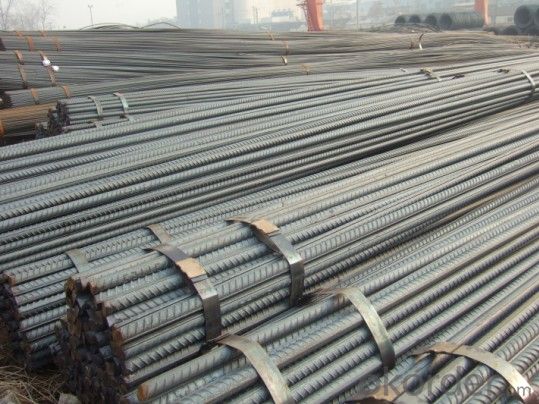
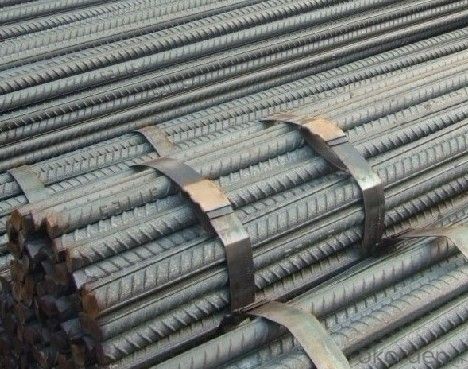
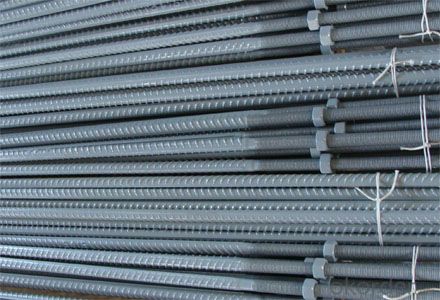
- Q: How do steel rebars improve the flexural strength of concrete?
- Steel rebars improve the flexural strength of concrete by providing tensile strength, which is typically lacking in concrete. The rebars act as reinforcement, absorbing the tension forces that occur when the concrete is subjected to bending or flexing. This combination of concrete and steel rebars creates a composite material that is stronger and more resistant to cracking or breaking under flexural loads.
- Q: What are the cost implications of using steel rebars in construction?
- The cost implications of using steel rebars in construction can vary depending on several factors. Firstly, the cost of steel rebars themselves will have an impact on the overall construction budget. The price of steel rebars can fluctuate due to factors such as global demand, availability of raw materials, and market conditions. Therefore, the cost of steel rebars can differ from one project to another. Secondly, the quantity of steel rebars required for a construction project will also affect the cost implications. The size, complexity, and load-bearing requirements of the structure will determine the amount of steel rebars needed. As a result, larger and more intricate projects will require a higher quantity of steel rebars, which can increase the overall construction costs. Moreover, the installation and labor costs associated with steel rebars should be considered. Experienced and skilled labor is required to properly install and secure the rebars in place, ensuring structural integrity. The cost of labor can vary depending on the location, availability of skilled workers, and project timeline. Additionally, the equipment and tools necessary for handling and cutting steel rebars may incur additional expenses. Furthermore, the longevity and durability of steel rebars can have long-term cost implications. Steel is known for its strength, resistance to corrosion, and ability to withstand harsh environmental conditions. By using steel rebars, structures can have a longer lifespan and require less maintenance and repairs over time. This can result in significant cost savings in terms of maintenance and replacement expenses. However, it is also important to consider potential cost implications related to sustainability and environmental impact. The production of steel rebars requires substantial energy and resources, which can contribute to carbon emissions and environmental degradation. In some cases, alternative construction materials or methods may be more cost-effective in terms of sustainability and long-term environmental considerations. In summary, the cost implications of using steel rebars in construction depend on factors such as the price of steel, quantity required, labor costs, installation expenses, and long-term durability. While steel rebars offer numerous benefits in terms of strength and longevity, it is crucial to consider the project's specific requirements and balance them with potential economic and sustainability considerations.
- Q: Do steel rebars need to be coated with any protective materials?
- Yes, steel rebars often require a protective coating to prevent corrosion and extend their lifespan. Coatings such as epoxy, zinc, or galvanized coatings are commonly used to protect rebars from environmental factors and ensure their structural integrity in reinforced concrete structures.
- Q: What is the effect of welding defects on the performance of steel rebars?
- The performance of steel rebars can be significantly affected by welding defects, which can weaken their structural integrity and compromise the overall strength and durability of the construction project. Porosity is one of the common welding defects, caused by the presence of gas pockets or voids in the weld. This weakens the weld joint, reducing its load-bearing capacity and making it more prone to cracking or breaking under stress. As a result, the rebars may not be able to resist external forces, such as the weight of the structure or seismic activities, potentially leading to collapse or structural failure. Another welding defect is lack of fusion, which happens when there is insufficient bonding between the base metal and the weld metal. This creates a weak joint that can easily separate or crack under load. Lack of fusion can decrease mechanical strength and compromise structural performance as the rebars may not be able to withstand the expected load or forces. Additionally, the presence of weld spatter or excessive weld reinforcement can also have a negative impact on the performance of steel rebars. Weld spatter refers to undesirable splashes or droplets of molten metal that can stick to the rebar's surface, creating potential weak points. Excessive weld reinforcement adds unnecessary weight to the rebar and creates stress concentrations, further increasing the risk of failure. In conclusion, welding defects can significantly affect the performance of steel rebars by weakening their structural integrity, reducing load-bearing capacity, and increasing the likelihood of cracking or breaking under stress. Therefore, it is crucial to implement proper welding techniques and quality control measures to minimize or eliminate these defects and ensure the safety and reliability of the construction project.
- Q: How do steel rebars contribute to the ductility of reinforced concrete structures?
- Steel rebars contribute to the ductility of reinforced concrete structures by providing reinforcement and increasing tensile strength. The rebars act as a skeleton within the concrete, absorbing and distributing external forces such as tension and compression. This reinforcement prevents the concrete from cracking or failing under stress, allowing the structure to withstand greater loads and deform without collapsing, thus enhancing its overall ductility.
- Q: What are the different types of steel rebars used in underground constructions?
- There are several different types of steel rebars that are commonly used in underground constructions. These rebars are used to reinforce concrete structures and provide additional strength and durability. 1. Carbon Steel Rebars: Carbon steel rebars are the most commonly used type of rebars in underground constructions. They are made from carbon steel and have high tensile strength, making them suitable for various applications. 2. Epoxy-Coated Rebars: Epoxy-coated rebars are carbon steel rebars that are coated with an epoxy layer. This coating provides corrosion resistance, making them ideal for underground constructions where moisture and chemicals are present. 3. Stainless Steel Rebars: Stainless steel rebars are highly resistant to corrosion and have excellent strength properties. They are often used in underground constructions where extreme environmental conditions, such as high humidity or saltwater exposure, are expected. 4. Galvanized Rebars: Galvanized rebars are carbon steel rebars that have been coated with a layer of zinc. This coating provides enhanced corrosion resistance, making them suitable for underground constructions in areas with high levels of moisture or exposure to chemicals. 5. Fiberglass Rebars: Fiberglass rebars are made from glass fibers embedded in a resin matrix. They are lightweight, corrosion-resistant, and have high tensile strength. Fiberglass rebars are often used in underground constructions where non-magnetic properties are required, such as near sensitive equipment or in areas with electromagnetic interference concerns. Each type of steel rebar has its own advantages and is selected based on the specific requirements of the underground construction project. Factors such as environmental conditions, load-bearing capacity, and expected lifespan are considered when choosing the appropriate type of steel rebar for a particular application.
- Q: Are steel rebars susceptible to creep deformation?
- Yes, steel rebars are susceptible to creep deformation. Creep is the tendency of a material to slowly deform over time under a constant load or stress. Although steel is a strong and durable material, it can still experience creep deformation under sustained loading conditions, especially at elevated temperatures. This is an important consideration in structural engineering, as it can impact the long-term behavior and stability of reinforced concrete structures that utilize steel rebars.
- Q: How do steel rebars contribute to the overall durability and service life of concrete structures?
- Steel rebars contribute to the overall durability and service life of concrete structures in several ways. Firstly, steel rebars are used in concrete structures to enhance their tensile strength. While concrete is strong in compression, it is relatively weak in tension. By adding steel rebars, which have high tensile strength, to the concrete, the overall strength and load-bearing capacity of the structure are significantly increased. This helps the structure to withstand external forces such as wind, earthquakes, or heavy loads, reducing the risk of structural failure and increasing its overall durability. Secondly, steel rebars play a crucial role in preventing cracking and controlling the propagation of cracks in concrete structures. Concrete has a tendency to shrink and crack when it dries and undergoes temperature changes. The presence of steel rebars helps to distribute these forces and stresses throughout the structure, minimizing the formation and widening of cracks. By restricting crack propagation, the rebars contribute to the overall structural integrity and longevity of the concrete structure. Furthermore, steel rebars provide reinforcement against corrosion. Concrete is highly alkaline, which creates a protective layer around the steel rebars, known as the passivation layer. This layer prevents the steel rebars from rusting and corroding when exposed to moisture or aggressive chemicals. By maintaining the integrity of the rebars, the overall durability and service life of the concrete structure are enhanced. In addition, steel rebars are essential in improving the structural stability and resilience of concrete structures. By providing reinforcement and stiffness to the concrete, they help to distribute and dissipate the applied loads and stresses evenly. This reduces the risk of localized failure and increases the ability of the structure to withstand external forces and deformations. The presence of steel rebars also improves the structural behavior of the concrete, making it more resilient to dynamic forces such as vibrations or impacts. Overall, steel rebars significantly contribute to the overall durability and service life of concrete structures. They enhance the tensile strength of the concrete, prevent cracking and control crack propagation, provide reinforcement against corrosion, and improve the structural stability and resilience. By incorporating steel rebars in concrete construction, engineers can create robust and long-lasting structures that can withstand various challenges and ensure the safety and longevity of the built environment.
- Q: Can steel rebars be used in the construction of road bridges or flyovers?
- Steel rebars are indeed applicable in the construction of road bridges or flyovers. Owing to their remarkable strength and durability, they are widely utilized as reinforcement in concrete structures such as bridges and flyovers. By fortifying the concrete, these rebars amplify its structural integrity and load-bearing capacity, making it capable of withstanding heavy traffic loads and enduring the forces encountered by road bridges and flyovers. Furthermore, steel rebars furnish heightened resistance to corrosion, a vital attribute in bridge construction where exposure to environmental factors is prominent. In summary, the utilization of steel rebars guarantees the structural stability, longevity, and safety of road bridges and flyovers.
- Q: What are the common problems associated with steel rebars in concrete structures?
- Some common problems associated with steel rebars in concrete structures include corrosion, inadequate cover, improper placement, and insufficient anchorage. Corrosion can weaken the rebars and lead to structural deterioration. Inadequate cover refers to the insufficient distance between the rebar and the surface of the concrete, which can increase the risk of corrosion. Improper placement can result in poor load distribution and compromised structural integrity. Insufficient anchorage occurs when the rebars are not properly embedded in the concrete, reducing their ability to resist tension forces.
Send your message to us
ASTM A615 deformed steel bar for construction
- Loading Port:
- Tianjin
- Payment Terms:
- TT OR LC
- Min Order Qty:
- 25 m.t.
- Supply Capability:
- 100000 m.t./month
OKorder Service Pledge
OKorder Financial Service
Similar products
Hot products
Hot Searches
Related keywords
